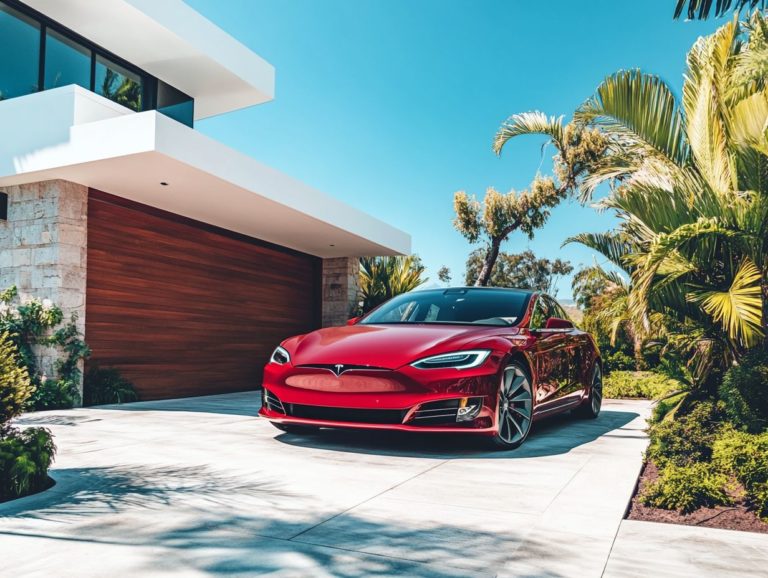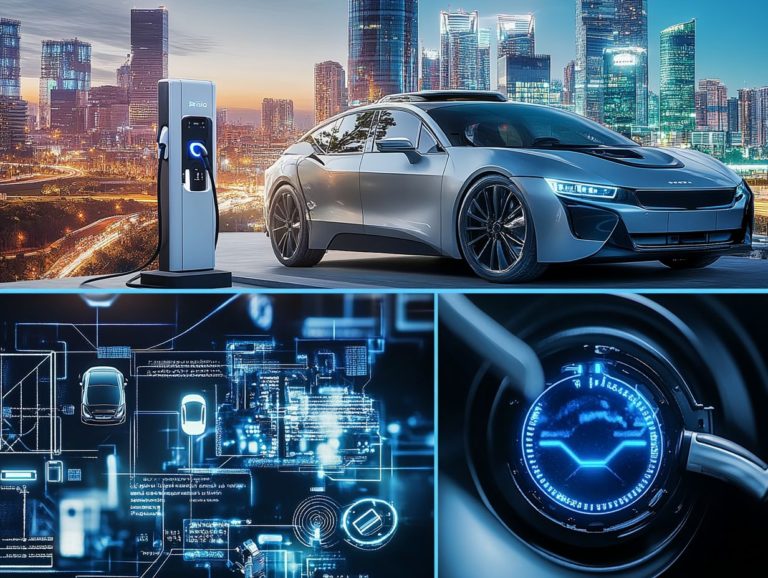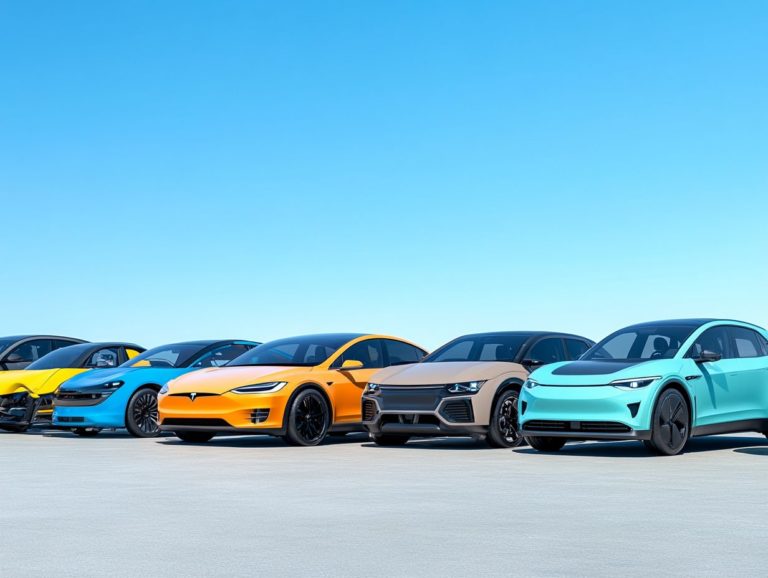The Rise of Chinese Electric Vehicle Brands
As the world embraces sustainable transportation, the Chinese electric vehicle (EV) market is emerging as a formidable force. This market is playing a big role in global automotive trends.
With remarkable growth and immense potential, Chinese brands are transforming the domestic landscape and making significant strides on the global stage. This exploration delves into the dynamics propelling this surge, highlights key players in the market, and scrutinizes the challenges they encounter amid increasing competition.
Uncover the driving factors behind the ascent of Chinese EV brands and gain insight into what the future may hold for this dynamic industry. Don’t miss out on the revolution in sustainable transportation!
Contents
- Key Takeaways:
- Overview of Chinese Electric Vehicle Market
- Major Chinese Electric Vehicle Brands
- Factors Driving the Rise of Chinese Electric Vehicle Brands
- Challenges and Opportunities for Chinese Electric Vehicle Brands
- Frequently Asked Questions
- What is the current state of Chinese electric vehicle brands in the global market?
- What factors have contributed to the rise of Chinese electric vehicle brands?
- How have Chinese electric vehicle brands been received in the international market?
- What sets Chinese electric vehicle brands apart from other global brands?
- Are there any challenges that Chinese electric vehicle brands face in their rise to the top?
- What Can We Expect from the Future of Chinese Electric Vehicle Brands?
Key Takeaways:

- China’s electric vehicle market is rapidly growing and has immense potential, making it a key player in the global automotive industry.
- The top Chinese electric vehicle brands, such as BYD and NIO, are gaining significant market share and competing with established brands.
- Government support and policies, along with new technologies, drive the rise of Chinese electric vehicle brands.
Overview of Chinese Electric Vehicle Market
The Chinese electric vehicle market has firmly established itself as a powerhouse in the global automotive landscape, playing a big role in EV adoption rates, new technologies, and market dynamics.
With formidable contenders like BYD and Tesla engaged in intense competition, the landscape is enriched by government subsidies that encourage eco-friendly vehicles and cutting-edge battery technologies. The swift rise of electric vehicles in China not only mirrors evolving consumer preferences. It also underscores significant implications for national security and supply chain dependencies.
With global competition heating up, it’s crucial to understand this exciting market. Grasping the intricacies of this dynamic market becomes essential for stakeholders aiming to navigate its complexities effectively.
Growth and Potential
The growth of the Chinese electric vehicle market offers substantial potential, fueled by favorable market trends and an increasing adoption of EVs across diverse consumer segments.
Battery technology advancements significantly influence this expansion. These advancements have enhanced energy density and reduced charging times, making electric vehicles (EVs) far more appealing to consumers. Economic pressures are driving manufacturers to innovate and present competitively priced models.
A noteworthy shift in consumer preferences toward sustainable transportation is further propelling this trend. Recent surveys reveal that over 60% of potential buyers are leaning toward eco-friendly vehicles.
Industry projections indicate that by 2030, the Chinese EV market may represent over 40% of total vehicle sales, underscoring its pivotal role in global automotive trends.
Major Chinese Electric Vehicle Brands
The landscape of major Chinese electric vehicle brands is shaped by influential players such as BYD, Tesla, and Geely Auto. Each of these companies brings its distinct contributions to the automotive industry’s growth and innovation, reflecting the dynamic evolution of this sector.
Overview of Top Brands
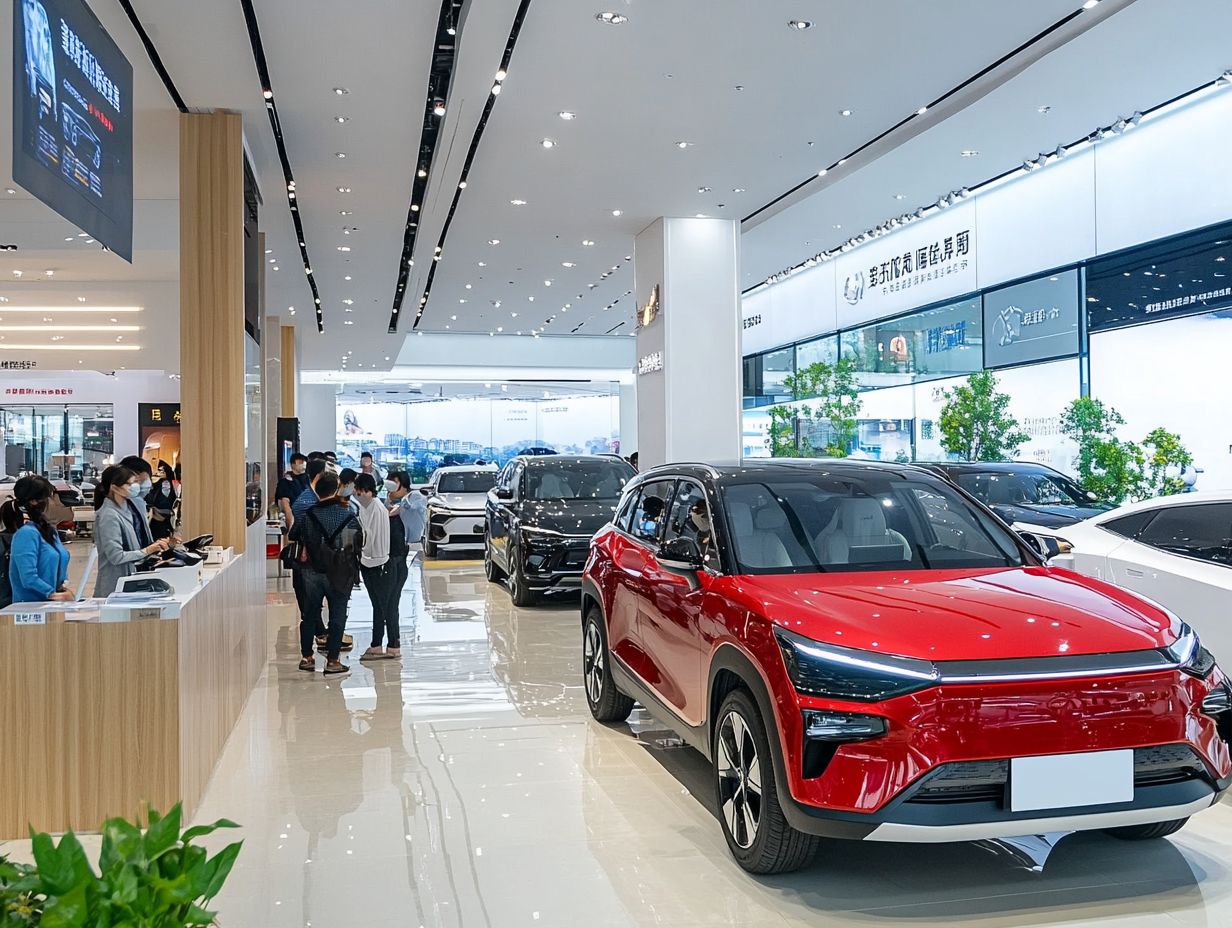
The leading brands in the Chinese electric vehicle market, such as BYD, Tesla, and Li Auto, exemplify a remarkable combination of innovation and vehicle quality that truly sets them apart from the competition.
Each of these manufacturers has crafted unique selling propositions that resonate with the evolving demands of consumers. For instance, BYD stands out with its extensive array of affordable yet high-performing electric vehicles. Meanwhile, Tesla captures attention with its cutting-edge technology and robust commitment to sustainability. Li Auto, in contrast, appeals to those seeking hybrid solutions, offering the flexibility necessary for longer journeys.
Trust is a cornerstone of these brands’ success; they have positioned themselves as reliable players in a rapidly expanding market. Their relationship with government subsidies has further accelerated their growth, providing crucial financial incentives that enable ongoing innovation and help them maintain a competitive edge.
Current market share data reveals that you re looking at BYD and Tesla as the frontrunners in the Chinese electric vehicle sector. This showcases significant consumer preferences and fierce competition within the automotive landscape.
This competitive arena shapes brand visibility and influences the pricing strategies companies adopt to attract your changing tastes. Recent charts paint a vivid picture of a tight race, where BYD’s innovative approach enables it to seize a substantial market share, while Tesla s established reputation continues to lure in loyal customers.
Comparative analyses suggest that as these two giants battle for supremacy, they constantly influence each other’s pricing strategies. This prompts adjustments that directly affect your purchasing decisions. This dynamic interplay between competition and market share fosters an environment where you enjoy better options and pricing strategies tailored just for you.
Factors Driving the Rise of Chinese Electric Vehicle Brands
The ascent of Chinese electric vehicle brands is driven by a strong mix of government backing, cutting-edge technological advancements, and shifting market dynamics that emphasize sustainability and consumer priorities, reflecting trends highlighted in the rise of electric vehicle startups in 2024.
Government Support and Policies
Government support plays an essential role in shaping policies that encourage EV adoption in China. Various subsidies significantly influence market trends and capture consumer interest.
These policies also offer substantial financial incentives for both manufacturers and consumers, including tax reductions, rebates, and grants that aim to lower purchase costs. By effectively reducing the barriers to entry, these initiatives make EVs more affordable and create a sense of urgency among potential buyers.
As a result, you will see more consumers choosing electric options at an accelerated pace. These subsidies also stimulate investment in charging infrastructure, enhancing the convenience and appeal of EVs. Ultimately, this leads to a stronger adoption rate across diverse demographics.
Technological Advancements

Technological advancements, especially in battery technologies and energy efficiency, are transforming the Chinese electric vehicle market and driving innovation among automotive manufacturers.
This shift not only enhances the quality of vehicles but also significantly reduces operational costs for you, the consumer. As a result, brands like BYD and Tesla are leading with their cutting-edge solutions, establishing benchmarks that others aspire to reach.
BYD s emphasis on LFP (Lithium Iron Phosphate) battery technology, a type of battery known for its safety and long life, has made their vehicles more accessible to a wider array of buyers. Meanwhile, Tesla continues to break new ground with its proprietary battery developments, enhancing range while lowering the overall lifecycle costs of their vehicles.
These innovations are fostering a more competitive marketplace, motivating all players to elevate their technological standards.
Challenges and Opportunities for Chinese Electric Vehicle Brands
Chinese electric vehicle brands encounter a distinct array of challenges and opportunities within a swiftly changing market. This landscape is marked by intense competition and potential trade barriers that could influence their entry into the global arena.
In conclusion, the rise of Chinese electric vehicle brands presents both exciting opportunities and notable challenges. Explore the innovative options available in the electric vehicle market today!
Competition with Traditional Automakers
The competition between Chinese electric vehicle brands and traditional automakers is reshaping the market. It influences pricing strategies tailored to evolving preferences.
As established companies pivot towards electric vehicles (EVs), they innovate in technology and redefine their marketing. They embrace sustainability to attract environmentally conscious buyers.
This transformation requires a strong focus on research and development. Significant investments go toward battery technology and improving range.
To engage customers who may be brand loyal yet hesitant about EVs, clear messaging and education about the benefits of switching to electric alternatives are crucial.
The implications for consumer behavior are huge, as preferences evolve, and brand recognition increasingly depends on how companies position themselves in this changing landscape.
Expanding into Global Markets
Expanding into global markets brings both challenges and opportunities for Chinese electric vehicle brands. Trade barriers and local needs are critical for successful market entry.
To navigate these complexities, understanding local consumer preferences is crucial. Tailor design features and user experiences to resonate with local culture.
Compliance with regional regulations and air quality regulations is essential for building trust with consumers. Addressing pricing barriers through strategic partnerships and innovative financing options enables competitive pricing while maintaining quality.
This strategic approach ensures your global advancements are significant and impactful.
Frequently Asked Questions
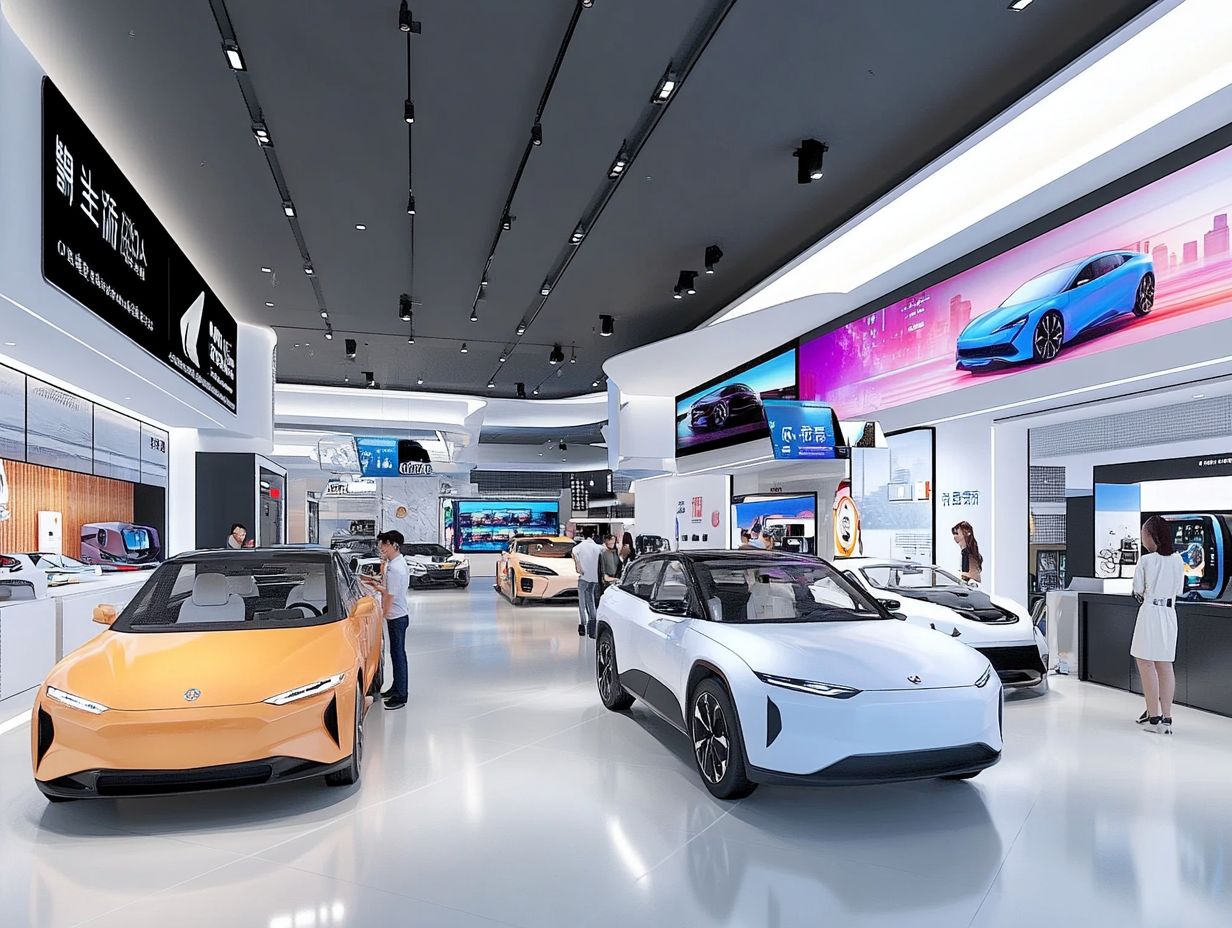
What is the current state of Chinese electric vehicle brands in the global market?
Chinese electric vehicle brands are quickly gaining popularity and market share worldwide. They re recognized for advanced technology and competitive pricing.
What factors have contributed to the rise of Chinese electric vehicle brands?
The Chinese government’s push for sustainable transportation has significantly boosted these brands. Generous incentives and investments in research have also played a key role.
How have Chinese electric vehicle brands been received in the international market?
These brands have gained momentum both locally and internationally. Their innovative technology and high-quality products challenge traditional automakers.
What sets Chinese electric vehicle brands apart from other global brands?
These brands excel in advanced technology, especially in battery production and autonomous driving. Their quick adaptation to consumer demands highlights their commitment to sustainability.
Are there any challenges that Chinese electric vehicle brands face in their rise to the top?
Despite gaining traction, these brands face challenges like brand recognition and quality concerns. They are focused on product improvement to build trust with consumers.
What Can We Expect from the Future of Chinese Electric Vehicle Brands?
Exciting times lie ahead for Chinese electric vehicle brands. With continued government support and investments in research and development, they are poised for growth.
These brands will expand their global reach. They will introduce advanced technology and become even more established in the electric vehicle industry.

